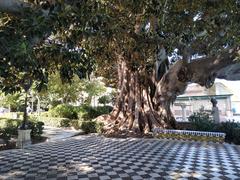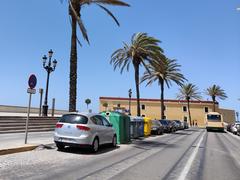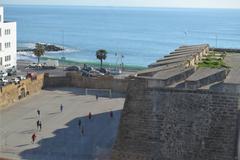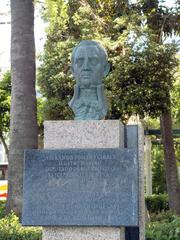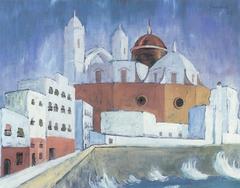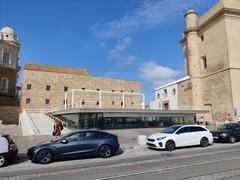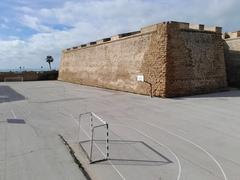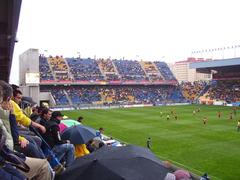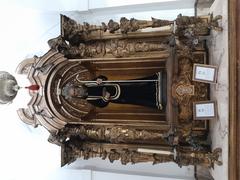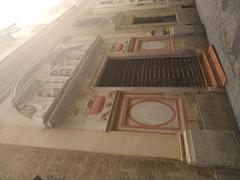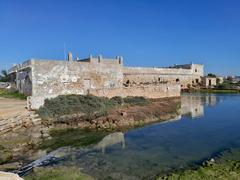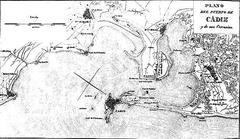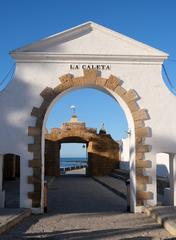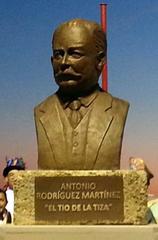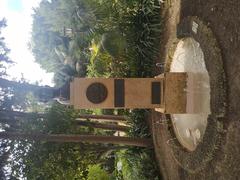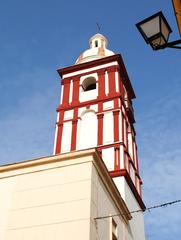Plaza de Fray Félix, Cádiz, Spain: Visiting Hours, Tickets, and Attractions Guide
Date: 14/06/2025
Introduction: History and Cultural Significance
Plaza de Fray Félix, located in the historic center of Cádiz, Spain, stands as a vivid testament to the city’s centuries-old legacy. As one of Cádiz’s oldest squares, its story begins in the medieval period, closely linked to the Church of Santa Cruz (the Old Cathedral) and the city’s transformation into a vibrant port during the Age of Discovery (Cadiz.es). The plaza’s iconic empedrado paving—crafted from stones once used as ballast in Spanish galleons returning from the Americas—symbolizes Cádiz’s deep maritime connections.
Architecturally, Plaza de Fray Félix showcases a harmonious blend of Gothic, Renaissance, Baroque, and Mudéjar influences. Surrounding the square are historic structures like the Church of Santa Cruz, Casa de la Contaduría (now the Museo Catedralicio), and other notable buildings that map the city’s evolution (Hitos de Cádiz; Cadiz Cultural). Its two-level design, connected by a monumental Baroque stairway, reflects centuries of urban planning and adaptation.
Today, Plaza de Fray Félix is not only a historical landmark but a vibrant social hub, home to cultural initiatives like Fundación Centro Tierra de Todos. Throughout the year, the plaza hosts religious processions, local festivals, and community gatherings, solidifying its status as a living tapestry of Cádiz’s cultural mosaic (Fundación Centro Tierra de Todos).
This guide offers a detailed look at the plaza’s history, architectural highlights, visitor information (including hours and tickets), accessibility tips, and nearby attractions, making it an essential resource for travelers, history enthusiasts, and culture seekers alike (Guía de Cádiz).
Table of Contents
- Origins and Early History
- Architectural Evolution
- Visiting Information: Hours, Tickets, Accessibility, and Tours
- Cultural and Social Significance
- Notable Events and Historical Moments
- Visitor Experience and Practical Tips
- Architectural and Urban Highlights
- Nearby Attractions, Dining, and Amenities
- FAQs
- Summary Table of Key Features
- References
Origins and Early History
Plaza de Fray Félix’s roots reach back to the 13th century, when Cádiz’s Christian reconquest sparked the development of the city’s new urban core. The plaza, named for a revered local religious figure, became an epicenter for religious and civic gatherings, closely tied to the Church of Santa Cruz (Cadiz.es). Its strategic location near the port and ancient city walls elevated its importance, especially as Cádiz grew into a vital maritime hub during the Age of Discovery.
Architectural Evolution
The Empedrado: Stones from the New World
The square’s unique empedrado paving is a historic marvel. These multicolored, rounded stones were used as ballast in Spanish ships returning from the Americas, then repurposed to pave Cádiz’s streets and plazas in the 16th and 17th centuries (Cadiz.es). Today, they are a tangible link to the city’s seafaring past.
Church of Santa Cruz (Catedral Vieja)
The Church of Santa Cruz dominates the plaza, originally built in the 13th century on the site of a former mosque. After the 1596 Anglo-Dutch attack, it was reconstructed with elements spanning Gothic, Renaissance, and Baroque styles (Cadiz Cultural). Its austere exterior and elegant interior reflect centuries of architectural evolution.
Surrounding Structures
Historic buildings frame the plaza, including the Casa de la Contaduría (now Museo Catedralicio), with its Renaissance/Manierist façade, and the Casa del Obispo, built atop Phoenician and Roman remains (Hitos de Cádiz). The Baroque stairway by Felipe de Gálvez and the 18th-century well and humilladero also contribute to the square’s layered character.
Visiting Information: Hours, Tickets, Accessibility, and Tours
- Plaza Access: Open 24/7 as a public space.
- Church of Santa Cruz: Monday–Saturday: 10:00–13:30, 17:00–19:30; Sundays/Holidays: 10:00–13:30.
- Museo Catedralicio: Tuesday–Saturday: 10:00–14:00; Sunday: 10:00–13:30; closed Mondays.
- Tickets: Plaza entry is free. Church of Santa Cruz is generally free (donations welcome). Museo Catedralicio charges approximately €3–5 (discounts for students and seniors).
- Guided Tours: Recommended for historical context and access to multiple sites; book via local operators.
- Accessibility: The empedrado paving can be uneven. Surrounding streets offer smoother access. Some historic sites may be challenging for those with limited mobility; contact venues for assistance.
Cultural and Social Significance
Maritime Heritage
The empedrado stones symbolize Cádiz’s role as the gateway between Europe and the Americas, reminding visitors of the city’s golden era as Spain’s principal Atlantic port (Cadiz.es).
Religious and Civic Life
The plaza has long served as a center for religious processions, especially during Semana Santa, and remains a favorite venue for cultural events and public gatherings.
Preservation and Modern Use
Ongoing preservation ensures the plaza’s architectural integrity, while its tranquil atmosphere and regular events make it a cherished space for both residents and visitors (Cadiz.es).
Notable Events and Historical Moments
- Anglo-Dutch Attack of 1596: The Church of Santa Cruz was heavily damaged, prompting significant reconstruction (Cadiz Cultural).
- Cortes of Cádiz (1812): The old town, including the plaza, buzzed with political activity during the drafting of Spain’s first liberal constitution (Wanderlog).
- Modern Festivals: The plaza is central to Semana Santa processions and Cádiz Carnival celebrations.
Visitor Experience and Practical Tips
Walking the plaza’s centuries-old stones, visitors are immersed in Cádiz’s maritime history and religious traditions. For the best experience:
- Visit in the early morning or late afternoon for fewer crowds and optimal photography.
- Wear sturdy footwear suitable for uneven surfaces.
- Check event calendars during major festivals for unique cultural experiences.
Architectural and Urban Highlights
Urban Layout and Key Buildings
Plaza de Fray Félix features a two-level design, linked by a Baroque stairway adorned with vegetal and geometric motifs (Hitos de Cádiz). The upper level is anchored by the Catedral Vieja and Casa de la Contaduría, while the lower level connects to the winding streets of Barrio del Pópulo.
Barrio del Pópulo and Festive Traditions
The plaza is the heart of Barrio del Pópulo, Cádiz’s oldest quarter, and a focal point for religious processions like the Good Friday “Madrugada” (Semana Santa Cádiz).
Nearby Attractions, Dining, and Amenities
- Nearby Landmarks: Cádiz Cathedral, Church of Santa Cruz, Roman Theatre, and Museo Catedralicio are all within a five-minute walk.
- Dining: Sample local cuisine at nearby tapas bars such as El Faro de Cádiz and Taberna Casa Manteca.
- Facilities: Cafés provide restrooms for patrons; benches and shaded areas are available in the plaza.
- Transport: The plaza is a 10–15 minute walk from the train and bus stations; taxis and several city bus lines provide easy access.
Frequently Asked Questions (FAQ)
Q: What are the visiting hours of Plaza de Fray Félix?
A: The plaza is open 24/7. Nearby attractions generally open 10:00–18:00; check official sites for current hours.
Q: Is there an entrance fee?
A: No fee for the plaza. Museum and church entries may require tickets.
Q: Are guided tours available?
A: Yes, bookable through local operators.
Q: Is the plaza accessible for visitors with disabilities?
A: The plaza is generally accessible but has uneven paving and a stairway; alternative routes are available.
Q: What events take place at the plaza?
A: Semana Santa processions, concerts, art exhibitions, and community festivals are held throughout the year.
Summary Table: Key Features
| Feature | Period | Style/Function | Notable Details |
|---|---|---|---|
| Catedral Vieja de Santa Cruz | 13th century+ | Gothic, Baroque, Neoclassical | Detached Mudéjar tower, ornate altars, stained glass |
| Casa de la Contaduría | 15th–16th c. | Renaissance/Manierist | Diamond-point portal, wooden galleries, marble wellhead |
| Casa del Obispo | 16th–18th c. | Residential/Archaeological | Phoenician/Roman remains, 18th-century redesign |
| Stairway and Balustrade | 17th century | Baroque | Designed by Felipe de Gálvez, vegetal/geometric motifs |
| Well and Humilladero | 18th century | Functional/Religious | Oyster stone, hemispherical dome, wrought-iron cross |
| Retablo Cerámico | 20th century | Religious Decorative Art | Ceramic altarpiece by Fernando Orce Guerrero |
Visual Gallery
Panoramic view of Plaza de Fray Félix with empedrado paving and Church of Santa Cruz.
Alt text: Plaza de Fray Félix in Cádiz with historic empedrado stones and Church of Santa Cruz.
Close-up of empedrado stones.
Alt text: Detailed view of multicolored empedrado stones in the plaza.
Interior of the Church of Santa Cruz.
Alt text: Nave and main altarpiece inside Church of Santa Cruz.
Summary and Call to Action
Plaza de Fray Félix is a microcosm of Cádiz’s rich historical and cultural evolution. From its distinctive empedrado paving to the architectural marvels and dynamic community life, the square offers an immersive experience. Plan your visit with practical information on hours, tickets, and accessibility, and don’t miss the opportunity to join local festivities or guided tours. Download the Audiala app for self-guided audio tours, real-time updates, and in-depth content to enrich your journey.
References
- Plaza de Fray Félix in Cádiz: Visiting Hours, Tickets, and Historical Insights (Cadiz.es)
- Architectural and Cultural Significance (Hitos de Cádiz)
- Plaza de Fray Félix: Cultural Heritage, Social Life, and Practical Tips (Fundación Centro Tierra de Todos)
- Plaza de Fray Félix: Church of Santa Cruz (Old Cathedral) (Cadiz Cultural)
- Discover Plaza de Fray Félix: Visiting Hours, Tickets, and Cádiz Historical Sites (Guía de Cádiz)
- Practical Visitor Information (Wanderlust Chloe Cádiz Travel Guide)
